A Quote by Brandon Sanderson
The purpose of a storyteller is not to tell you how to think, but to give you questions to think upon.
Related Quotes
What did you put in the fire?" Kaladin said. "To make that special smoke?" "Nothing. It was just and ordinary fire." "But, I saw-" "What you saw belongs to you. A story doesn't live until it is imagined in someone's mind." "What does the story mean, then?" "It means what you want it to mean," Hoid said. "The purpose of a storyteller is not to tell you how to think , but to give you questions to think upon. Too often, we forget that.
Working with Robert, Robert [Elswit] is a storyteller. He's not a cinematographer, he's a storyteller. And to me, that's the graduation I hope to get to in my profession. That I'm not just an actor, I'm a storyteller. And I think that takes a long time in, when you have one job on a movie set. Makeup artists, actor, whatever. To graduate from just that to storyteller.
The great philosophers of the 17th and 18th centuries did not think that epistemological questions floated free of questions about how the mind works. Those philosophers took a stand on all sorts of questions which nowadays we would classify as questions of psychology, and their views about psychological questions shaped their views about epistemology, as well they should have.
Science is very good at answering the 'how' questions. 'How did the universe evolve to the form that we see?' But it is woefully inadequate in addressing the 'why' questions. 'Why is there a universe at all?' These are the meaning questions, which many people think religion is particularly good at dealing with.





































